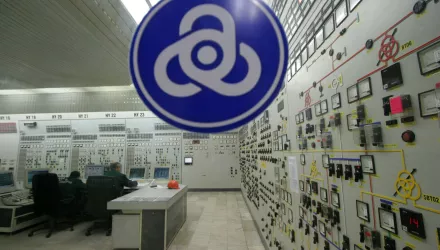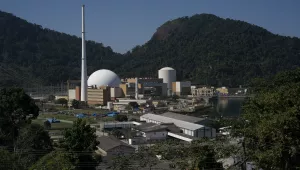
Note
A Hebrew-language version of the op-ed appeared in Haaretz on February 28, 2018. The translation was provided by the author.
While our leaders in Jerusalem were giddily drinking champagne and Washington was proudly trumpeting tweets, the Middle East continued its march towards the nightmare scenario of a region with multiple nuclear actors.
This time, it's not just about Iran, but about the rapid spread of civil nuclear programs all around us. The various programs reflect legitimate energy needs, but civil nuclear programs in the Middle East have a nasty tendency to morph into military ones, or at least into the technological basis for this.
Saudi Arabia already consumes approximately 25 percent of its total oil production and unless it diversifies its sources of power — astonishingly — it risks becoming a net importer of oil by the early 2030s. The Saudis thus recently issued tenders for the first two of sixteen planned nuclear power reactors.
In addition to energy needs, the Saudi program is also motivated by fear of Iran, along with growing doubts regarding the reliability of the American security guarantee, and a consequent desire to ensure that the kingdom has the infrastructure in place for a military program.
The Saudis are also opposed to the U.S. demand that they forgo the right to enrich uranium, as a condition for the sale of American reactors. This condition is considered essential today to ensure that civil nuclear programs are not misused for military purpose and both Egypt and the UAE accepted it in deals with the United States in recent years.
The 2015 nuclear deal with Iran recognizes its right to continue uranium enrichment, albeit at lower levels, thus making it difficult for the United States to now demand that the Saudis forgo a similar capability. The United States is also concerned that if it insists on this demand the Saudis may turn to other manufacturers, including Russia and China, which impose less stringent conditions for the sale of reactors and ongoing inspection.
It is thus now considering a waiver for the Saudis, but this is likely to lead to similar demands by Egypt and the UAE and to a heightened Iranian threat perception. The result could be a collapse of the nuclear agreement and a regional nuclear arms race.
Russia is using nuclear deals and arms sales to resurrect its standing in the region. It recently concluded a nuclear cooperation agreement with Saudi Arabia and also signed its first arms deal with it, including advanced anti-aircraft systems, missiles, and more.
In December 2017, Russia also signed a deal with Egypt to build and finance four nuclear power reactors by 2028 and to establish factories in Egypt to manufacture some of the necessary components. Some observers believe that there are more cost-effective means of producing energy in Egypt and therefore question the deal's motivations.
Last year, Russia also began supplying advanced fighter aircraft and helicopters to Egypt and tentative agreement was even reached providing, for the first time since the Soviet eviction from Egypt in 1974, for Russian use of Egyptian airbases.
The Egyptian and Saudi slaps in America's face resounded all the way to Washington.
In 2016, Russia signed a deal with Jordan for two nuclear power reactors, to be completed by 2025. A nuclear research reactor, of South Korean manufacture, became operational in Jordan in 2016.
In the UAE, the first of four South Korean power reactors, to be built by 2020, will become operational this year. In 2017, Russia signed $2 billion in arms deals with the UAE, including advanced air-defense systems and missiles, and it is reportedly considering Sukhoi fighters. Turkey also purchased similar air-defense systems recently and Bahrain, Qatar, and Morocco have expressed interest. The Russians have already deployed these systems in Syria.
Israel is being surrounded by civil nuclear programs on all sides. There is no immediate danger, and it would take many years, possibly decades, to turn these programs into military ones, but the technological clock may have begun ticking. Moreover, these programs may undermine the relative regional stability gained by the Iran nuclear deal.
In weighing its policies towards these developments, Israel faces a difficult dilemma which does not exist in the case of Iran today, nor had existed in Syria, Iraq, and Libya in the past.
The countries in question all maintain formal, or de facto peace with Israel, share a desire to contain Iran, are friends of the United States and enjoy at least some American commitment to their defense.
In reality, Israel does not have a military option against them, except in extreme circumstances, and thus Jerusalem is approaching the end of the "Begin Doctrine," which held that it must act militarily, after exhausting other options, to eliminate nuclear threats.
On this issue, as is the case of the other primary challenges Israel faces today (the Palestinians, Iran, the "northern front"), Israel does not have an effective military option, at a price it is willing to pay, and is increasingly coming up against the limits of military force. The IDF can gain time for decision-makers, but the only true solution to these challenges may lie, if at all, in the diplomatic realm.
Israel should urge the United States to insist that the Saudis forgo uranium enrichment. Even at this turning point, when Israel hopes for a breakthrough with Riyadh, it should oppose a decision that may spark a regional nuclear arms race. A possible compromise, however, that might preserve both Saudi interests and face, may be found in the recent proposal by the noted U.S. nonproliferation expert, Robert Einhorn, to craft a "practical compromise" — limiting the agreement to a period of fifteen years. In the future, the United States can always demand an extension.
A further possibility would be to urge the administration to pursue a new international norm, among the six countries that manufacture reactors today, to make their sale contingent on the recipient's willingness to forgo uranium enrichment and to purchase nuclear fuel from the manufacturer throughout the reactor's lifetime. This will not be easily achieved, American competitors will fear the loss of a commercial advantage at a time when a number of deals are in play, but the principle is acceptable to all and a deal is worth the try.
In the longer run, these developments, along with already existing trends, will require that Israel devote considerable thought to its strategic policies. The danger of a Middle East with multiple nuclear players may require that Israel reconsider its policy of ambiguity, seek a defense treaty with the United States, or even explore what is today still considered a totally fanciful option: regional arms control.
In the meantime, they're still drinking champagne in Jerusalem.
Statements and views expressed in this commentary are solely those of the author and do not imply endorsement by Harvard University, the Harvard Kennedy School, or the Belfer Center for Science and International Affairs.
Freilich, Chuck. "The Middle East Is Marching Towards Israel's Nuclear Nightmare Scenario." Belfer Center for Science and International Affairs, Harvard Kennedy School, February 28, 2018.




